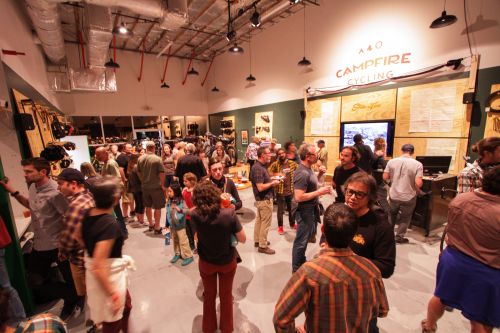TUCSON, Ariz. (BRAIN) — Josh Lipton, the founder and president of Campfire Cycling, took a meandering route into e-commerce and then into brick-and-mortar retail. First he designed and built a shipping case and travel trailer in 1999 that worked off the existing BOB trailer and then launched his Cello bike case online in 2004.
From the start, "We saw that we were selling more Bobs and trailer parts than our own product," Lipton said. So he rapidly built out other e-commerce sites like biketrailershop.com, bikebagshop.com, trailer.com and bikekidshop.com.
"We launched at the right time," noted Lipton. "We learned the 'getting traffic' game, hired a couple employees and soon had a full-time developer and six staffers. We were doing great with multiple brands of trailers, balance bikes, Ortlieb bags and Tubus racks."
In 2013, Lipton moved his growing business from Flagstaff to Tucson. His sales peaked at $3 million in 2015. And then the internet caught up with him. "We were hitting some big bumps, which included an outdated e-commerce platform and a stale brand," Lipton said.
"The market was changing toward Instagram over SEO and keywords. Our key suppliers like Burley and Thule were selling through Amazon. Our sales were declining to the point where we either needed to make some big changes or shut down."
So in early 2018, Lipton came up with the Campfire Cycling concept offering products that protected MAP pricing and weren't available on Amazon. In November 2019, he held a grand opening of a retail showroom and event space in Tucson focused on all things bicycle camping, bike packing and road touring.
"One of our first events was hosting Lael Wilcox and her film," said Lipton. "Over 200 people showed up, which was a great way to launch the store." Campfire Cycling also features a full-service repair center; the main bike brands are Jamis, Surly and Bombtrack. "Our bike sales are a trickle at this point. Our real strength locally as well as nationally is in bike bags," noted Lipton.
Lipton's perception of the state of the market is, "... mostly anecdotal and based on gut instinct." He sees three distinct areas: road touring and bike packing at the extremes, with the emerging gravel market in the middle.
"The road market seems mature," Lipton said. "The core participants are baby boomers and they're getting older. Bike packing is where the excitement is, the huge area of growth for us as the market emerges." Campfire's 2019 sales of $420,000 in-store and online combined were 1/3 road touring, 1/3 bike packing and 1/3 camping gear and bike accessories.
Campfire's accessory sales are based on products with good brand recognition but without market saturation. They've done well with Brooks saddles, touring-specific tires such as the Schwalbe Marathon, and electronics like dynamo hubs and Garmin gear.
Campfire Cycling is showing strong signs of recovering from reliance on the internet while it builds its core audience of Gen Xers and Millennials. "We're experimenting with a hybrid of e-commerce and local business," Lipton concluded. "We're in a unique position and we're excited about both the local and national energy we're capturing."


